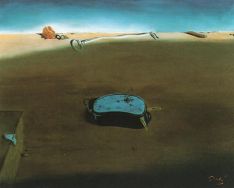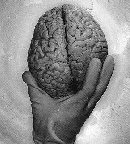 [en]
[en]
The New York Times’s article Is Social Networking Killing You? quotes the neuroscientist Susan Greenfield telling the Daily Mail about social networking:
My fear is that these technologies are infantilizing the brain into the state of small children who are attracted by buzzing noises and bright lights, who have a small attention span and who live for the moment.
I already wrote about her in No identity and I appreciate her efforts in advising people about the inner transformations caused by technology.
When, in Brave New World by Aldous Huxley, the governor asked youths if they never faced a difficulty which couldn’t be overcome and had to endure a long time between a desire and its fulfillment, after some silence (during which the director started to become nervous while waiting), one of them confessed that once he had to wait almost four weeks before a woman whom he was attracted to conceded herself to him. The strong feeling associated with the waiting was “horrible” according both to the youngster and the governor, which the latter added that our ancient people were so stupid that, when the first reformers came to save them from those horrible feelings, they would reject them.
In Huxley’s Brave New World people were conditioned even before being born and life was engineered in such a way that every desire was satisfied in a short time. In case of unpleasurable feelings, there was soma, the perfect drug with no side effects.
The whole world of technologies revolves around avoiding idle time and silence. Waiting became equivalent to frustration and efficiency and speed are the qualities most cherished in technological fields. Internet technology brought the tendency to speed to new levels, which was already present in traditional media like radio or TV, where pauses or silences are consciously avoided. I don’t have a TV since a long time, but in the rare cases I do see it, I notice a progressive acceleration in editing and switches of context, with a drive to avoid vacant spaces, short though they may be.
The Internet experience, even though interactive, is even more extreme in this trend. Our attention is split between different applications which produce much input and flow of information which interact faster and faster with our clicks.
But the most fulfilling human experiences need a certain time to be internalized. To enter the flow of a dance, in making love and in meditation, time is needed. Looking for instant fulfillment is a childish peculiarity. The ability to hold and feel frustration is a gym to bring awareness to our feelings and to create a bigger container for them.
In one spiritual workshop I experienced the association between the activation of the shakti energy of kundalini and frustration. The activation of energy is modulated by the capacity to feel frustration and, staying in it without acting it out to discharge it.
In a certain way, meditation itself is an exercise in acceptance and awareness of frustration. There are few things as frustrating as sitting without doing anything and observing thoughts arising, sometimes trivial or boring, at other times associated with impatience or with feelings difficult to hold. Ecstatic states can be achieved during meditation as well, but, usually after that, some inner knots get melted in the form of awareness.
Technologies avoid reflective time and tend to minimize the gaps between a want and its fulfillment, causing irritation when there isn’t a quick response to our inputs, feeding the persistance of a childish attitude toward reality this way.
However, the quest for a null gap between a desire and its fulfillment reminds me of the condition described by spiritually realized people who, living in the “here and now,” don’t have any separation between what the mind desires and reality. There is a synchronization with reality, where the mind doesn’t filter any more what should be from what we want. Since there isn’t anybody any more who wants anything, the alignment with reality is total. Those states are not exclusive for enlightened people, but everybody gets a glance of them, even though for a short time. Somehow, looking for evermore speed at a technological level shows the need, limited to the mind’s plane, to enter the continuous flux which cancels frustration and desires themselves.
Anyway, on the mind’s plane, for as much as we can reach more speed (and if fact is the goal of most technological development), frustration is not going to disappear: rather, the quest for fulfillment becomes evermore greedy in a mechanism which reminds one of addiction. The mind, in itself, won’t ever have enough desires, information, or speed. Somehow the mind looks for the liberation of the desires/frustration couple, seeking immediate fulfillment, but finds instead reiteration and their multiplication.
See also:
Information Dopaminated
Taking away attention
Disembodying at broadband speed
Computer addiction as survival for the ego
Multitasking to nothing
[/en][it]
L’articolo del New York Times Is Social Networking Killing You? cita le parole della neuroscienziata Susan Greenfield al Daily Mail a riguardo dei social network:
Il mio timore è che queste tecnologie portano ad un’infantilizzazione del cervello in uno stato simile a quello dei bambini piccoli che vengono attratti da ronzii e da luci brillanti, con una scarsa capacità di concentrazione e che vivono al momento.
Avevo già scritto a riguardo della Greenfield in Senza identità ed apprezzo i suoi sforzi nel mettere in guardia sulle trasformazioni interiori causate dalla tecnologia.
Quando, ne Il mondo nuovo di Aldous Huxley, il governatore chiese ai giovani se non avessero mai incontrato un ostacolo insormontabile e subire un lungo intervallo di tempo tra la coscienza di un desiderio e il suo compimento, dopo un certo silenzio (durante il quale il direttore iniziò ad innervosirsi per l’attesa) uno dei giovani disse” Una volta dovetti attendere quasi quattro settimane prima che una ragazza ch’io desideravo mi si concedesse”. Il governatore quindi chiese “E avete provato, di conseguenza, una forte emozione?” “Orribile!” disse il ragazzo. “Orribile; precisamente” disse il Governatore. “I nostri antichi erano talmente stupidi e corti di vista che, quando vennero i primi riformatori e si offersero di salvarli da quelle orribili emozioni, non vollero aver niente a che fare con essi.”
Ne Il mondo nuovo di Huxley le persone vengono condizionate già prima della nascita e la vita era congegnata in modo che ogni desiderio venisse soddisfatto in tempi brevi. In caso di emozioni spiacevoli c’era a disposizione il soma, la droga perfetta senza effetti collaterali.
Tutto il mondo delle tecnologie è fatto per evitare i tempi morti e il silenzio. Attendere è diventato equivalente a provare frustrazione e la rincorsa all’efficienza e alla velocità sono le qualità più apprezzate in campo tecnologico. La tecnologia di Internet ha portato la tendenza alla velocità a nuovi livelli, già presente nei media tradizionali quali la radio o la televisione, dove vengono evitati accuratamente le pause ed il silenzio. Pur non possedendo la televisione da tempo, nelle poche volte che mi capita di vederla noto un’accelerazione progressiva nell’editing e nei cambi di contesto, manifestando una volontà di evitare pause e vuoti, per quanto brevi siano.
L’esperienza su Internet, pur se interattiva, è ancora più esasperata in questa direzione. La nostra attenzione è divisa tra diverse applicazioni le quali producono parecchi input e flussi informativi che interagiscono sempre più velocemente con i nostri clic.
Ma le esperienze umane più appaganti richiedono un certo tempo per essere interiorizzate. Per entrare nel flusso della danza, del fare l’amore e della meditazione ci vuole tempo. La ricerca dell’appagamento immediato è una caratteristica infantile. La capacità di contenere e sentire la frustrazione è una palestra per portare consapevolezza alle nostre emozioni e per creare un contenitore sempre più ampio per queste.
In un workshop spirituale ho fatto esperienza dell’associazione tra l’attivazione dell’energia shakti della kundalini e la frustrazione. L’attivazione dell’energia viene modulata dalla capacità di percepire la frustrazione e di stare con questa senza agirla o senza scaricarla.
In un certo senso, la meditazione stessa è un esercizio di accettazione e di consapevolezza della frustrazione. Ci sono poche cose altrettanto frustranti che sedere senza far nulla ed osservare pensieri che emergono, talvolta banali e noiosi, altre volte accompagnati da impazienza o da emozioni difficili da contenere. In meditazione possono giungere anche stati estatici, ma solitamente dopo che si sciolgono alcuni nodi interiori al fuoco della consapevolezza.
Le tecnologie ci evitano ogni pausa di riflessione e tendono a minimizzare gli intervalli tra un desiderio e la sua soddisfazione, causandoci irritazione quando non c’è una risposta rapida ai nostri input, alimentando così il perdurare di un’attitudine immatura verso la realtà.
Ma la ricerca di un intervallo nullo tra un desiderio e il suo appagamento mi ricorda la condizione descritta dagli individui spiritualmente realizzati i quali vivendo nel “qui e ora” non hanno la separazione tra ciò che desidera la mente e la realtà. Ci si “sincronizza” con la realtà dove la mente non filtra ciò che è da ciò che dovrebbe essere, ciò che è da ciò che si vuole. Non essendoci più nessuno che vuole alcunché, l’allineamento con la realtà è totale. Questi stati non sono esclusiva di un illuminati, ma chiunque ne ha fatto esperienza, seppur per un breve tempo. In qualche modo la ricerca di velocità sempre maggiore a livello tecnologico manifesta il bisogno, limitato al piano della mente, di entrare nel flusso continuo che annulla la frustrazione e i desideri stessi.
Tuttavia sul piano della mente, per quanto si possa raggiungere velocità sempre maggiori (e di fatto è lo scopo della maggior parte dello sviluppo tecnologico), la frustrazione non è destinata a sparire, anzi, la ricerca di soddisfacimento diventa sempre più famelica in un meccanismo che ricorda la dipendenza. La mente, in sé, non ne avrà mai a sufficienza di desideri, informazioni, velocità. In qualche modo la mnete cerca la liberazione dall’accoppiata desideri/frustrazione cercandone la soddisfazione immediata ma trova invece la reiterazione e la moltiplicazione degli stessi.
Vedi anche:
Dopaminati di informazioni
La cattura dell’attenzione
Rendendoci incorporei a velocità di banda larga
La dipendenza da computer per la sopravvivenza dell’ego
Il multitasking: strafare per niente
[/it]
 The world over, people using the Internet click on the same icons, use the same shortcuts in email and chats, connect with people through the same Facebook modalities. This is the globalization of minds. In the process of the digitalization of reality, regardless of content, we use predominantly the same limited mental channels and interact with the same tools.
The world over, people using the Internet click on the same icons, use the same shortcuts in email and chats, connect with people through the same Facebook modalities. This is the globalization of minds. In the process of the digitalization of reality, regardless of content, we use predominantly the same limited mental channels and interact with the same tools. In tutto il mondo, chi usa Internet clicca sulle stesse icone, usa le medesime scorciatoie linguistiche nelle email e nelle chat, si connette con gli altri attraverso le stesse modalità di Facebook. Questa è la globalizzazione delle menti. Nel processo di digitalizzazione della realtà, a prescindere dai contenuti, usiamo prevalentemente gli stessi limitati canali mentali e interagiamo con gli stessi strumenti.
In tutto il mondo, chi usa Internet clicca sulle stesse icone, usa le medesime scorciatoie linguistiche nelle email e nelle chat, si connette con gli altri attraverso le stesse modalità di Facebook. Questa è la globalizzazione delle menti. Nel processo di digitalizzazione della realtà, a prescindere dai contenuti, usiamo prevalentemente gli stessi limitati canali mentali e interagiamo con gli stessi strumenti.
 [en]
[en]





 [en]
[en]